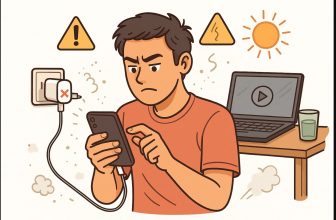Most people don’t realize how much of their online activity is being silently monitored. Every tap, swipe, search, or even conversation near a phone could be used to track your behavior, location, or preferences. In India, where internet access is growing fast but digital literacy is still catching up, many users unknowingly give away personal information—without any obvious warning.
This list outlines 10 signs that suggest you might be tracked online, and more importantly, what you can do to reduce it.
1. Ads Appear for Things You Only Talked About
You discuss a product or topic with someone—and suddenly see ads related to it on Facebook, Instagram, or YouTube. You never searched for it, yet it’s everywhere.
What this could mean:
Some apps may have microphone access and use it for behavioral targeting. This kind of passive surveillance is more common than you think.
What you can do:
- Check microphone access in app settings and disable it for apps that don’t need it.
- Turn off “ad personalization” in Google and Meta (Facebook) settings.
2. Battery Drains Faster Without Heavy Use
If your phone’s battery drains quickly even during light use, an app may be working in the background—accessing your location or other data without you realizing.
What you can do:
- Go to battery usage stats to see which apps are consuming power.
- Uninstall or restrict background activity for unnecessary apps.
3. Websites Know Your Location Without Asking
You open a website and it immediately shows your city or area—even though you didn’t enable location services.
What this means:
Websites can detect your location using your IP address or browser fingerprint.
What you can do:
- Use browsers like Firefox, Brave, or DuckDuckGo with tracking protection.
- Consider using a VPN to mask your location.
4. Apps Request Irrelevant Permissions
A photo editor asks for your contacts. A torch app wants access to your mic. These are signs that an app might be harvesting data.
What you can do:
- Review app permissions manually. Deny anything unrelated to the app’s purpose.
- Uninstall apps that seem suspicious or offer little value.
5. You Receive Emails or SMS Based on Recent Browsing
You browse a product or service, and within hours, you get promotional emails or messages—even if you didn’t sign up for anything.
What this means:
Your online behavior may be tracked via cookies or browser scripts.
What you can do:
- Clear cookies regularly.
- Use privacy-focused browsers with tracker-blocking features.
6. Search Results Feel Too ‘Tailored’
You notice that your search engine seems to know your preferences too well, often showing results that reflect your past behavior.
What this means:
Search engines like Google use your search history to personalize results, which may limit exposure to unbiased information.
What you can do:
- Use DuckDuckGo or Startpage for unbiased search results.
- Try browsing in incognito mode when researching sensitive topics.
7. Social Media Feeds Mirror Your Thoughts
Your feed starts showing reels, posts, or videos that seem eerily relevant to your mood or interests—even without typing anything.
What this means:
Platforms track how long you pause on posts, what you click, and even who you interact with most—building a psychological profile over time.
What you can do:
- Turn off off-platform activity in Facebook/Instagram settings.
- Limit usage of camera and mic permissions for social media apps.
8. Login Alerts from Devices You Don’t Recognize
You receive emails or app notifications saying your account was accessed from a new location or device—without your knowledge.
What you can do:
- Change your password immediately.
- Enable two-factor authentication (2FA) for all major accounts like Google, Facebook, and banking apps.
9. Your Device Slows Down Suddenly
Your phone or browser starts lagging without reason. Apps freeze or crash. This could mean unwanted software is running in the background.
What you can do:
- Run a malware scan using trusted antivirus or anti-spyware apps.
- Disable or remove unused extensions and apps.
10. Mobile Data Usage Seems Unusually High
You’re not streaming or downloading much, but your data pack finishes quickly. This may mean background tracking or app syncing without your consent.
What you can do:
- Check data usage app-wise in your phone settings.
- Disable background data access for non-essential apps.
Quick Summary: Signs You’re Being Tracked Online & What to Do
| Suspicious Sign | Action You Can Take Immediately |
|---|---|
| Ads appear for things you only talked about | Check microphone access, disable ad personalization |
| Battery drains faster than usual | Review battery usage, remove suspicious apps |
| Websites know your location without asking | Use VPN or privacy browser, turn off GPS |
| Apps ask for odd permissions | Deny access to features the app doesn’t need |
| You get ads or emails based on browsing | Block trackers, clear cookies, use private browsing |
| Search results feel overly filtered | Use private search engines like DuckDuckGo |
| Social feeds seem to read your mind | Turn off off-platform activity on social apps |
| Login alerts from unknown devices | Change password, enable two-factor authentication |
| Phone or browser slows down for no reason | Run anti-malware scan, disable suspicious extensions |
| Mobile data is used up unexpectedly | Restrict background data, check app data permissions |
Conclusion: You’re Not Paranoid – You’re Being Profiled
Online tracking is now a silent default—not an exception. From free apps to smart assistants, data collection has become deeply embedded in digital life. But that doesn’t mean you’re powerless.
By staying aware and making a few smart changes—like restricting app permissions, switching to private browsers, or using two-factor authentication—you can regain control over your digital footprint.
Your privacy is worth protecting. And it starts with awareness.





